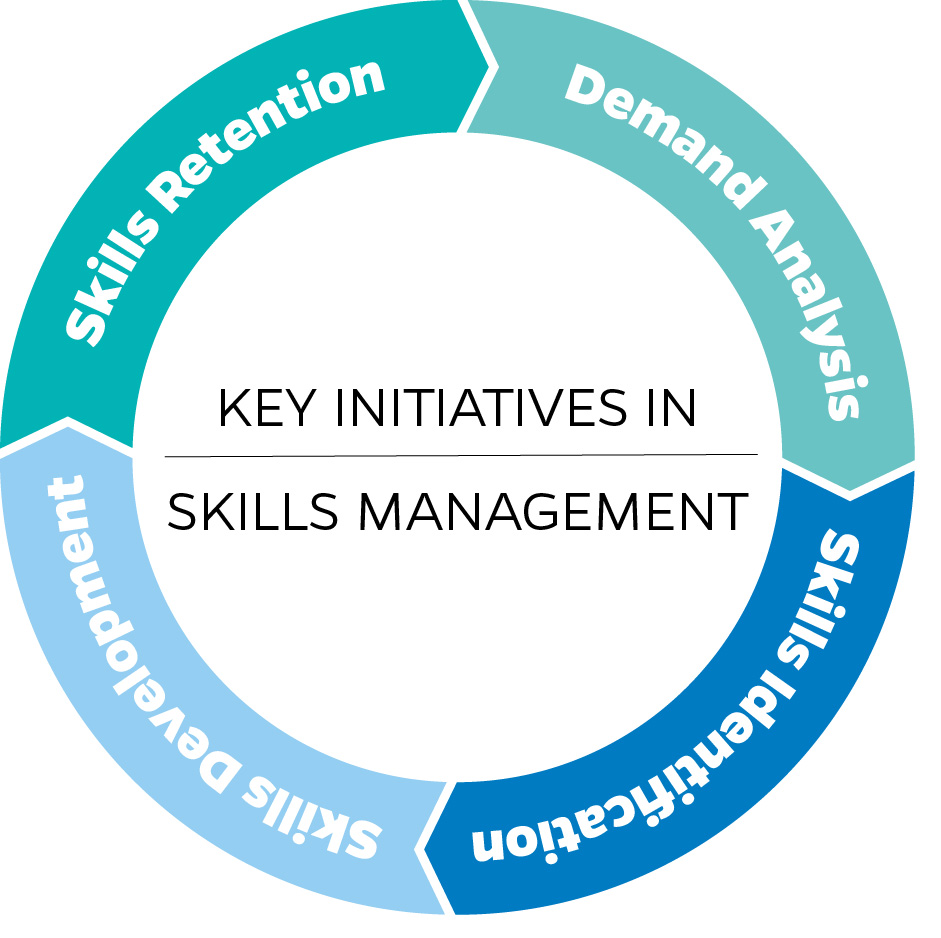Skills Management - Skills are the New Currency of Work.

At a time when technology and industry requirements are constantly changing, employees skills are becoming a valuable currency that guides employees and companies alike into the future. The targeted acquisition, development and application of skills has therefore high importance. Companies are increasingly realizing that their success is linked to the efficient management of existing skills and their further development.
Inhalt
↓ What is skills management?
↓ Why you should keep an eye on the talents of your employees?
↓ Core initiatives in skills management
↓ Skills management in conjunction with AI-powered WFM
↓ Future-proof through skills management
What is skills management?
Skills management describes the optimal use of all existing human resources in a company. It’s about determining the knowledge and skills required for individual tasks and projects, building up appropriate qualifications within the workforce, monitoring their validity and, if necessary, initiating appropriate training. The aim is to ensure that the demand for employees with the required skills is met and that sufficient employees can always be scheduled according to their qualifications at the right time and in the right workplace.
Why you should keep an eye on the talents of your employees?
Staff requirement planning, staff planning and training management are just some of the fields, skills management can influence. Companies with several employees should always keep an eye on the skills and talents of their staff. However, it is often difficult to maintain an overview. If important qualifications are overlooked, the existing potential is sometimes wasted and not all opportunities are fully exploited.
Expired certificates can even jeopardize personnel coverage in safety-critical areas such as airport security. To avoid bottlenecks in shift scheduling, it is advisable to use suitable software for skills management as part of workforce management. The efficient monitoring and control of qualifications ensures that the available personnel resources in companies are used efficiently.
In a service hotline, employees with strong communication skills and an empathetic approach to customers are particularly suitable for resolving complaints and difficult situations. Special language skills, such as those of a native speaker, or sales experience are also skills that bring added value to the team if they are used correctly.
Further examples can be found in the aviation industry. Companies must ensure that all employees meet the required safety standards. WFM software recognizes and reminds employees and leaders in good time when certificates are due to expire and excludes them from the skills plan for certain tasks until the certificate has been renewed. In conjunction with software-based training management, companies can automatically register employees for training courses. As part of workforce management, skills management helps to ensure that all employees have the necessary skills and qualifications and are scheduled in the right team or at the right workplace.
Key initiatives in skills management
- Demand analysis:
By analyzing current and future job requirements, companies can determine which skills are needed for specific tasks.
- Skills identification:
Companies should accurately record the existing skills and competences of their employees in order to make the best use of their potential or to identify gaps and initiate targeted measures to develop new skills.
- Skills development:
Employees can be supported in developing their skills and adapting to new requirements through training, professional development, and mentoring programs.
- Skills retention:
Companies must take measures to retain qualified employees in the long term, for example through attractive working conditions, career development opportunities and recognition of their performance and skills.

Skills management in conjunction with AI-powered WFM
Skills management in conjunction with AI-powered workforce management is the continuous monitoring, adaptation and deployment of the skills of employees in the company. Through automation and the use of artificial intelligence, companies can manage and optimize the skills and competencies of their employees more effectively. The demand for certain skills and qualifications can be accurately predicted and appropriate training and resources can be provided. AI-based algorithms analyze historical data to create optimized schedules.
In addition, skills management enables better allocation of employees to projects and tasks based on their individual skills and experience. This not only increases efficiency and productivity, but also boosts employee satisfaction as they are assigned to tasks that match their strengths.
Future-proof through skills management
The dynamic nature of today’s working world requires companies to be constantly adaptable. Agility is becoming a key factor for success at a time when requirements can change in the blink of an eye.
The development towards more agile companies goes hand in hand with targeted skills management. By allowing employees to increase their efficiency according to their skills and competencies and focus on areas where they are most needed. Efficiency then in turn enables new opportunities for flexible working arrangements and promotes a culture of collaboration and knowledge sharing.
Overall, the world of work is facing exciting changes. Companies that proactively address these changes will be able to adapt to the changing demands and succeed and increase their competitiveness.
Want to find out more?
Further information about our workforce management software plano WFM and the
areas of application here:
→ Workforce Management from plano
You can find an exciting report from Gartner® here.
Archive
Shift Scheduling 24/7
Fairness Accounts
Forecasting in the Call Center
We’re Here for You
